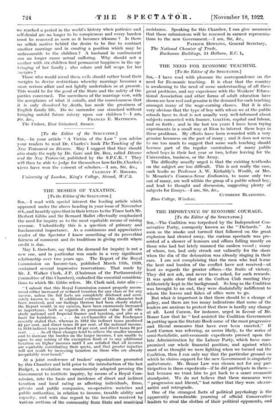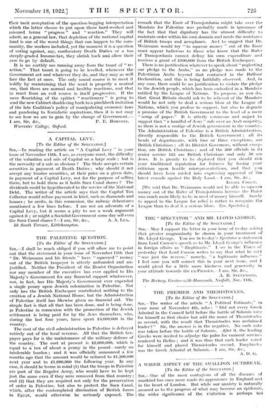THE IMPORTANCE OF ECONOMIC COURAGE.
• [To the Editor of the SPECTATOR.] SIR,—The Coalition was torpedoed by the Independent Con- servative Party, commonly known as the " Diehards." As soon as the smoke and turmoil that followed on the great explosion had cleared away, the curious spectacle was pre- sented of a shower of honours and offices falling mostly on those who had but lately manned the sunken vessel ; many of whom, too, had only struck out valiantly for the shore when the din of the detonation was already ringing in their ears. I am not complaining that the men who had borne the heat and burden of the conflict have not received—at least as regards the greater offices—the fruits of victory. They did not ask, and never have asked, for such rewards. It was quite clear that at the Carlton Club meeting they deliberately kept in the background. So long as the Coalition was brought to an end, they were disdainfully indifferent to whom the loaves and fishes of office were to go.
But what is important is that there should be a change of policy, and there are too many indications that some of the leaders are anxious to protest that there is hardly any change at all. Lord Curzon, for instance, urged in favour of Mr. Bonar Law that he " had assisted the Coalition Government in putting upon the Statute Book some of the most progressive and liberal measures that have ever been enacted." If Lord Curzon was referring, as seems likely, to the series of semi-Socialistic, anti-economic expedients pressed upon the late Administration by the Labour Paity, which have com- promised our whole financial position, and against which most of us thought we were fighting when we turned out the Coalition, then I can only say that the particular ground on which he claims support for the new Government is singularly unfortunate. Mr. Bonar Law was chosen not for any par- ticipation in these expedients—if he did participate in them— but because we trust him to get back to a saner economic standpoint. We do not believe that these measures were " progressive and liberal," but rather that they were obscur- antist and retrograde.
One of the strangest facts of political psychology is the apparently ineradicable yearning of official Conservative leaders to steal the clothes of their political opponents, and
their tacit acceptation of the question-begging interpretation which the latter choose to put upon those- hard-worked and misused terms " progress " and " reaction." They will admit, as a general law, that depletion of the national capital fund is one of the worst things that can happen to the com- munity, the workers included, yet the moment it is a question of voting against, say, confiscatory Death Duties or a too steeply-graded Income-tax, they shrink back and allow their case to go by default.
It is no earthly use running away from the taunt of " re- action." That taunt is going to be levelled, whenever the Government act and whatever they do, and they may as well face the fact at once. The only sound course is to meet it boldly by maintaining that the word is properly a neutral one, that there are normal and healthy reactions, and that to react from an evil course is itself progressive. If the mere flourishing of the epithet " reactionary " is going to ;end the new Cabinet shuddering back to a pinchbeck imitation of the late Coalition's policy of manipulating economic laws and pandering to Socialistic aspirations, then it is not easy to see how we are to gain by the change of Government.—







































 Previous page
Previous page